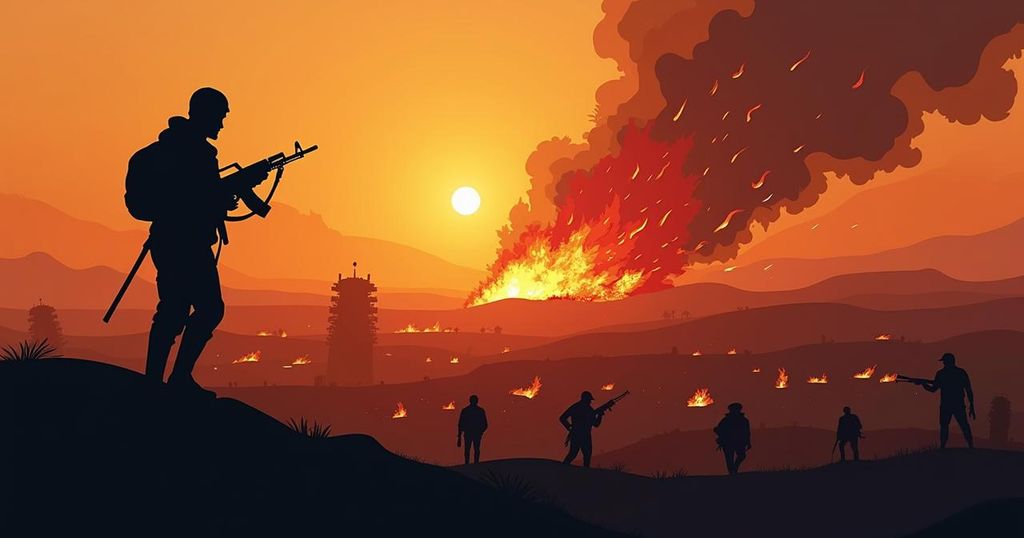The assassination of Hassan Nasrallah raises fears of a wider conflict in the Middle East involving Iran and Hezbollah. Diplomatic efforts led by the U.S. to stabilize the region are ongoing but face challenges, as both Israel and Hezbollah seem reluctant to de-escalate. Iran’s potential response and Israel’s actions in Lebanon indicate that regional escalation remains a real danger.
The assassination of Hassan Nasrallah, the leader of Hezbollah, has raised grave concerns about an impending broader conflict in the Middle East. As political tensions heighten, attention turns toward Iran and Hezbollah, questioning their potential responses to the recent developments. In the aftermath of the assassination, voices from the region echo warnings of a looming regional conflict. The anxiety surrounding the situation is palpable, with critical inquiries regarding the future course of events. However, the United States and its allies are evidently advocating for stability and seeking to prevent further escalation. Iran has expressed its discontent, cautioning Israel it will “regret their actions.” Hezbollah, already labeled a terrorist organization by several Western nations, stands in a precarious position following Nasrallah’s death, which President Joe Biden referred to as “a measure of justice.” As calls for de-escalation emerge, the effectiveness of the United States’ efforts to contain the crisis remains uncertain. Many diplomats speculate that the U.S. administration, having heavily invested in supporting Israel, expected a different trajectory in the region, especially towards the end of President Biden’s term. With tensions already fraught, the risk of Iran feeling compelled to intervene on behalf of Hezbollah poses a significant threat. Should Iran decide its long-standing ally is in critical danger, the situation could escalate dramatically, potentially spreading across the region. Conversely, it is essential to recognize that Iran, despite its aggressiveness, is typically pragmatic. The regime’s focus has historically been on preserving its authority, managing internal unrest, and navigating economic challenges exacerbated by sanctions. The question of whether Iran would risk a direct military engagement against Israel, especially when Hezbollah appears vulnerable, remains contentious. Additionally, the geographical distance from Iran complicates any direct military response, leading to considerations of a more cautious approach in favor of strategic patience. Meanwhile, Israel may perceive a window of opportunity to launch a ground offensive in Lebanon, potentially heightening hostilities with Hezbollah and drawing in various militia groups and Iranian forces based in neighboring Syria—a perilous endeavor that could bog down Israeli military resources in a challenging terrain laden with historical conflict. The political landscape within Lebanon itself is perilous, influenced by both internal divisions and external pressures. With the assassination of such a pivotal figure as Nasrallah, the fragile balance maintained amidst Lebanon’s sectarian strife faces significant upheaval, potentially leading the nation back into chaos. The present crisis casts a shadow over the future of the Middle East, as prolonged instability looms. While diplomatic efforts are vigorous, the answers to whether genuine peace can be achieved in the aftermath of Nasrallah’s death remain elusive, as both Israel and Hezbollah appear resistant to compromise.
The article examines the geopolitical ramifications following the assassination of Hassan Nasrallah, a significant development that may escalate tensions in the Middle East, particularly involving Iran and Hezbollah. It highlights the intricate dynamics between regional actors and the role of U.S. influence in mitigating conflict.
In conclusion, the assassination of Hassan Nasrallah has ignited serious concerns about increasing tensions in the Middle East, with potential ramifications depending on Iran’s response and Israel’s military intentions. It remains uncertain if these actors will pursue diplomatic avenues to de-escalate or if further conflict is inevitable, as the ongoing situation unfolds amidst a backdrop of historical grievances and power struggles within the region.
Original Source: news.sky.com






